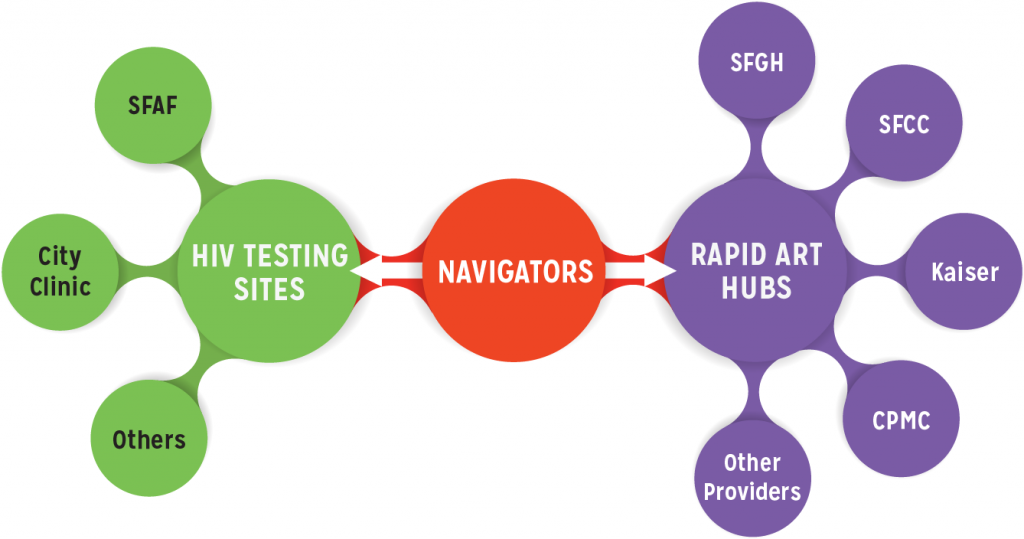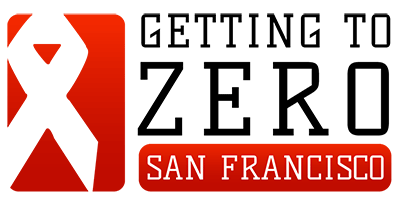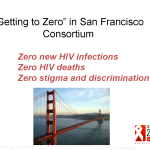
The overall goal of the RAPID (Rapid ART Program Initiative for HIV Diagnoses) program is to create a set of “hubs” around the city where persons newly diagnosed with HIV (or out of care) can rapidly access antiretroviral therapy (ART) and have a smooth transition to their medical home. In order to accomplish this goal, a RAPID steering committee established hub locations, standard operating procedure (SOP) for ART start, and SOP for transition to a primary medical home. The committee works with SF Department of Public Health surveillance (now “ARCHES”) to track the uptake and outcomes of persons participating in the program. We build on the existing LINCS programs at SFDPH to create and support hubs for rapid initiation of ART to individuals.
We start ART:
Within 48 hours –
- If acute/early infection (recent negative Ab test, RNA+/Ab– or recent symptoms of acute retroviral syndrome) or
- Evidence of advanced infection (opportunistic infection or a CD4 count of less than 200)
Within 5 days –
- All other newly HIV-diagnosed persons
The program aims to provide ART for up to 5 days for these individuals until they are transitioned into their medical home.
RAPID Resources
Publications
- *New* Outcomes of Rapid Restart Among People With Previously Diagnosed HIV at a Safety-Net HIV Clinic in San Francisco. JAIDS Journal of Acquired Immune Deficiency Syndromes 100(3):p 256-264, November 1, 2025.
- Development of a Citywide Rapid Antiretroviral Therapy Initiative in San Francisco. AJPM. 2021 November, Pages S47-S54.
- Decreased Time from HIV Diagnosis to Care, ART Initiation, and Virologic Suppression during the Citywide RAPID Initiative in San Francisco. CID. 2020 May 25.
- RAPID ART: High virologic suppression rates with immediate ART initiation in a vulnerable urban clinic population. AIDS. 2018 December 21.
News & Updates
National HIV/AIDS Prevention Conference: Frameworks for Getting to Zero
During the CDC’s National HIV/AIDS Prevention Conference in December 2015, Shannon Weber moderated a session titled “Frameworks for Getting to Zero” with panelists representing San Francisco, Washington State and New York State. Nearly 100 people attended the session—the room was packed. See below for the overview slides as well as the abstract presented by Dana Van Gorder behalf of…
Getting to Zero Report to the SF Health Commission
On December 1, 2015, Dr. Susan Buchbinder updated the San Francisco Health Commission on the Getting to Zero initiative.
World AIDS Day 2015 Community Report-Back
Approximately 60 community members gathered in the SF Department of Public Health’s 6th-floor meeting space to hear a report-back on progress made in 2015 toward Getting to Zero in San Francisco. The report-back was held the evening of World AIDS Day, December 1. Below please find slides from the presenters.
Please PrEP Me launch
PleasePrEPMe.org, the searchable, location-based California PrEP provider directory, has been launched! Included are 188 PrEP providers in half of the counties across the state of California. This statewide directory was born out of the original Bay Area PrEP Provider list, a collaboration between HIVE and City Clinic. Please take a look at the website at www.pleaseprepme.org,…




